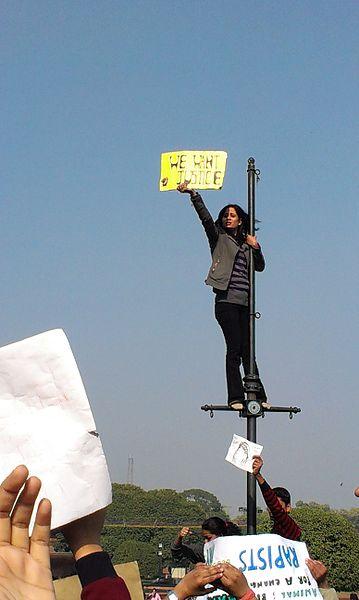Should the State Abdicate in the Name of Rape Survivor’s Agency?
A lot has been said about feminism in these past 10 days, in the context of the Tarun Tejpal case.
One of the questions which has come up is about who should, if at all, take cognizance of serious offences such as rape, whether it should be left entirely to the agency of women who are survivors of sexual assault, and the manner in which women’s organizations should offer support and guidance to the survivor. A group of feminists has wrongly interpreted the choice to be between “respecting the decisions of the complainant” and “unreflective statism”. In the present case, of course, the survivor has exposed as false the perception that some feminists had of her “decision” to seek justice through an internal committee and an apology: she has rejected both.

Image Courtesy: wikimedia.org
But, let us at the outset get one thing clear. The survivor writes: “Had I chosen silence in this instance, I would not have been able to face either myself or the feminist movement that is forged and renewed afresh by generations of strong women.” So she herself is very clear: silence is not an answer. Her understanding of the feminist response is seeking justice through institutional remedy. She at the outset rejected the rather sorry ‘apology’ (which reduced rape to an ‘untoward incident’) or an internal enquiry, which she had asked for ‘at the very least’. As soon as Goa police filed the FIR after taking suo moto cognizance, she recorded her statement and fully co-operated with the police. Therefore nothing in her demands or actions suggests that she was averse to an FIR and criminal proceedings so the use of ‘agency’ in opposition to statism is irrelevant here.
However, the broader question of agency within sexual violence remains to be addressed. In this case, agential feminists dismiss demands for criminal and police action as “unreflective statism” forgetting that if in the name of women’s agency the survivors have to shoulder the burden of deciding whether and how to pursue complaints against powerful perpetrators in cases of rape and aggravated sexual assault, the millions of dalit, adivasi, minority and poor women as well as women in ‘disturbed areas’ in the NE, J&K etc. who face structured sexual violence will face intimidation, humiliation and further exploitation and be compelled to remain silent. Is this ‘choice’, is this ‘agency’?
It is not enough to say that ‘the issue is quite different in situations of communal, caste violence or other conflict zones’, because patriarchy, the gender based division of labour and capitalism combine to put a vast majority of Indian women (in addition to those in overt situations ‘large scale intimidation’) in highly unequal and exploitative production and social relations. So the ‘differences’ encompass a majority of working and poor women, who are vulnerable in the existing oppressive structures, and those who can claim agency is restricted to a miniscule set of women (if that). This itself renders the privileging of women’s agency an exercise in elitism, In this case the question of agency has arisen because of her social position and clear articulation which obviously cannot be the basis of articulating a more universal position.
The demand for strict state and police action and greater reporting of crime against women has emerged in the historical context of a highly exploitative and unequal society, where women face myriad forms of oppression from a number of social, economic and strategic causes. A very small minority (if any) of women can lay claim to a truly free and informed decision making or ‘agency’. We have to stop and ask the question, why do women who have been raped not file FIRs? Why do they go to the police, the Courts, as a last resort? Is it agency based on a sense of empowerment and self confidence or is it the dread of an excruciatingly slow, non-responsive, easily corruptible and anti-woman system? If it is the latter, then surely the feminist movement has to demand greater transparency, accountability and responsiveness from the system rather than abdicate or resign.
In most cases, women ‘choose’ not to approach state institutions for justice because of their highly unresponsive and patriarchal character, and the influence wielded by the powerful over the state machinery. In other words, the many failings of the state machinery is what scares women and forces them to either remain silent, or choose other avenues for some justice, some closure. Is this what we mean by agency? Is this choice? Can we allow the failures and shortcomings of the state machinery to become a fait accompli to let the powerful (and self-confessed) perpetrators of rape escape without spending even a single day in jail? ‘Agency’ cannot become a vehicle of such disempowerment.
So while there can be no doubt that the complainant in the Tejpal case herself was very clear in wanting an appropriate institutional remedy and was deeply dissatisfied with the measures taken which were later sought to be justified as her “agency”, the appeal to her agency as the guiding principle in the justice system for rape victims in fact is nothing but a disastrous and regressive course towards making rape and aggravated sexual assault non-cognizable offences. As the survivor rues, “As seen by some of the responses to this case, instances of familial and custodial rape present doughty challenges to even the most adamantine feminists.” It goes against the statute and the case law, and on November 12th, 2013, the Supreme Court in its judgment on Lalita Kumari Versus Govt. of U.P. & Ors. held that “Registration of FIR is mandatory under Section 154 of the Code, if the information discloses commission of a cognizable offence and no preliminary inquiry is permissible in such a situation.” Does the feminist movement want to undo the cognizability of rape and aggravated sexual assault under the IPC? Surely not. An appeal to build the confidence of complainants to “control the pace of the follow-up, and also to decide how far to take it” should not have the unfortunate consequence of undermining the cognizability of rape as a crime.
Of course, the role of friends and confidantes of complainants is on a completely different footing and realm altogether from that of the employer, a manager or state institutions. The point is that the employer and the state have a statutory responsibility which cannot be evaded in the name of the complainant’s wishes. Further, another aspect is the severity of the crime. There are cases of a lesser nature which can (and perhaps should) be resolved through conciliation, dialogue, censure, apology or social and collective intervention. However, it certainly cannot be anybody’s brief that rape and aggravated sexual assault fall in that category.
It must be remembered that ‘agency’ is neither supra-historical nor transcendental; it is rooted firmly in the socio-economic and political milieu in which women live and exercise it. Under capitalism and neoliberalism, women’s agency becomes a tool and an avenue for further exploitation and surplus extraction through the gender based division of labour. Women’s responsibilities and work under capitalism in care, employment and society are patriarchal and exploitative, not their agency or choice. Equally, their growing unemployment under neoliberal capitalism is not their agency or choice to opt out of the workforce as has been argued by conservative economists, nor can their participation in highly exploitative production relations be considered their agency or choice (under for example piece-rated home based work in a putting out system). In other words, agency or choice too are embedded in social and production relations, and are unlikely to be empowering or gender just in the absence of a parallel and supportive effort to generate a socio-political environment that nurtures equality and promotes individual agency.
In any case, why invoke ‘agency’ only when the crime is rape against a woman? Is it not in a sense reinforcing the same stereotypes that we fight against? We never hear anyone argue that FIRs should not be filed by the police in the case of murders unless the victim’s family wants it, or that kidnappers should not be prosecuted without victim initiation. Why then in the case of rape are we willing to absolve the state of its responsibility, its duty, in punishing the guilty and providing justice. Why appeal to alternative grievance redressal which is somehow more ‘reflective’ than solutions within the system of criminal justice? Surely the solution to weaknesses in the statist route to justice lies in reforming it, democratizing it, making it gender-just and not in running away from it. The feminist movement in other words must create an environment through struggle that makes it less traumatic for survivors of sexual violence to seek justice from the state and pay attention to developing and supporting agency.
It is not the victim “that categorizes crimes: it is the law”, writes the brave journalist who has persisted in her fight for justice. And a lot of “brave women” have fought for the law. Undoubtedly, we need to fight further, to force the state machinery to be sensitive, responsive and just, so that complainants access the system to demand justice and not opt out due to its many failings; so that ultimately real feminist agency trumps a defeatist silence.
Disclaimer: The views expressed here are the author's personal views, and do not necessarily represent the views of Newsclick
Get the latest reports & analysis with people's perspective on Protests, movements & deep analytical videos, discussions of the current affairs in your Telegram app. Subscribe to NewsClick's Telegram channel & get Real-Time updates on stories, as they get published on our website.
























